Hairless head - very beautiful
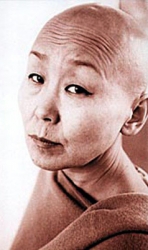 - Sainkho, what is your main character trait? - Sainkho, what is your main character trait?
- Curiosity.
- And being non-standard?
- Being non-standard is more of a result.
In the West, probably, it is less conspicuous, because people are more tolerant. To behave extravagantly or to look different from the others is not such a very noticeable thing. Artists and singers are perceived as people of a different world, and society accepts their out of the ordinary characteristics calmly.
- Did it take a great inner effort to shave your head?
- No. I was 43 at the time. My management was in Milan, and Milan is the Italian Mecca of fashion. And they would design new clothing for me for every new album. And for one of the albums, they found a long cashmere dress, form-fitting, with bare shoulders. And something like a shawl that I could wrap myself in.
The result was a kind of a monk-like image, so I suggested to shave my head. And they shaved my head. As a matter of fact, it suits me very much. It is very laconic, ascetic, at that time nobody else was doing it.
So that is how I performed with the ensemble: bald head, tight dress, a sort of - not quite- shawl - something delicately lilac with a purplish tinge. It was very beautiful.
Not everybody understood it, and when the girls from "Tyva Kyzy" saw me with my shaved head in Switzerland, where we performed together, they were shocked, totally speechless. They simply concentrated on their instruments and played without lifting their heads. True, later they calmed down and got used to it.
A fifteen-second scream
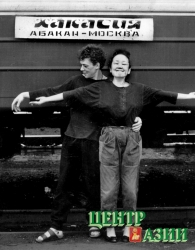 - Do you have a double citizenship? - Do you have a double citizenship?
- No, only one. I am a citizen of Austria. Right now I have Russian visa for one year, until the end of 2011.
- How come you could not keep your Russian citizenship?
- Because Austria does not allow double citizenship. It is possible in Germany, in Belgium, Holland, in France, but in Austria it is not possible. I have been an Austrian citizen since 1995.
- How did Austria come into your life?
- I married an Austrian. Georg Graf - musician, saxophone player. He saw me in Austria at a concert and fell in love, he was totally crazed. I went to Germany, to Berlin, and he followed me, he lived in Berlin for three months without work, without any means.
Georg is an excellent family man, a man of a holy soul, totally pure. When we got married in 1991, and with my daughter went to live in Austria with him, Chai-Suu was already fourteen. A teenager who had to jump all of a sudden into a totally different language environment. Georg helped her to learn German, and took care of her.
I trusted him hundred percent. They lived together when I was away. And I had a tough schedule of trips and tours. When I retuned, there would be laundry to do, ironing, so that everything would be clean and ready for my husband and daughter.
And whenever I was at home, then breakfast, lunch and dinner were always guaranteed. His friends used to come specifically to try Russian dishes that I was cooking. They liked it very much. I cooked only Russian food. Sometimes, if I had a chance, I cooked Tuvan food.
So in all that endless rush, time from time we had a chance just to be together, to take a walk. I loved to walk, and he would take me to the village to visit his grandmother. They had a house near Vienna. It was such a very strict Catholic family. Everything was calculated to the minute, every little spoon, every tiny object had its own place. Such super-organized environment.
They loved my daughter very much, simply spoiled her. And they were impressed by my modesty of and Asian woman: always behind my husband, silent, modest, conscientious.
He was never irritated with whatever success I had. He had a philosophical attitude to it, and to the attention of other men who watched me and idolized me as a singer. He understood all of this. But the only thing that was difficult for him to accept were my endless trips. He thought that if we got married, I would stop traveling so often, that I would stop working. But I kept traveling, I could not stop.
I can swear that I was a very loyal person. But I can imagine what his friends could be telling him when I was not there. And he could not stand all my endless tours and those intrigues.
So at a certain moment the conflict grew so strong that it was impossible to hide it. My daughter later told me what it looked like from outside. We were each doing our own thing, and suddenly we started walking around the room very fast. And suddenly we turned face to face with each other. And we both screamed for fifteen seconds: "Aaaaa!" Without words. And then again - silence.
She saw it only once. Fifteen seconds of a scream, and that was it. We split up.
Chai-Suu calls Georg 'father' to this day. And my grandson Timur calls him grandpa.
Music of the World
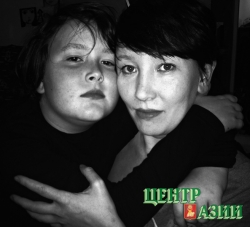 - When you showed me the poster of the international jazz and folk music festival, which took place in 1989 in Abakan, you called it historical. Why? - When you showed me the poster of the international jazz and folk music festival, which took place in 1989 in Abakan, you called it historical. Why?
- Because in my artistic life there are two important dates: 1986 - Krasnodar, and 1989 - Abakan.
It was the first festival in our country where I performed as an improviser. Because it was an international festival, huge numbers of foreigners were present. Magnificent!
Just imagine, the Iron Curtain had just been torn down, and people from the whole world were simply tearing into Siberia and everywhere they could. The festival was full of the Swiss, Germans, Italians, French, Scandinavians - all the Scandinavian countries were represented.
There were many managers: Italian show-business, people from Kazakhstan, representatives from music agencies which were just beginning to sprout up, and Artem Troickiy was there as well.
And the most important part: the founders and innovators were there, jazz and folk musicians. Immense possibilities for contact and cooperation.
That festival was not historical just for me. It was the beginning of "world music", music of the world.
The idea of combining folk music with the jazz standard was born precisely there - in Abakan.
- Have you been to all the countries of the world?
- No. I have not been to all the countries of Latin America. I have been only to North Africa. I would like to go to Mongolia, Vietnam. And I would like to see Alaska, it is a huge expanse of land.
- Who are the musicians of the world, with whom it was most interesting for you to work in joint projects?
- It was very interesting for me to work with Ned Rothenberg. It is also interesting to work with Italian musicians, regardless of if they are doing world music or playing jazz.
I would also like very much to play again with William Parker and Hamid Drake, they are Afro-American musicians. One lives in Chicago, the other in New York.
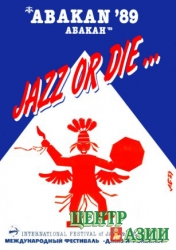 I would like to meet again with Bobby McFerrin, because he improvises, because he is light like an angel, and I would like to work again with Butch Morris and his orchestras of improvised music. I would like to meet again with Bobby McFerrin, because he improvises, because he is light like an angel, and I would like to work again with Butch Morris and his orchestras of improvised music.
And I would like to work some more with contemporary composers and improvisers from China, Hong Kong, Vietnam and Korea who work in the field of experimental music.
I would very-very much like to meet again with American Indians and with my Scandinavian colleagues - singers from the Saami people, who also followed the road of enriching their folk music at the expense of contemporary music. And I would like to see again the sun at midnight in Norway. Their ethno-jazz festivals are called "Midnight Sun" : they start at seven in the evening and end at five in the morning. Then they all go home to sleep and meet again in the evening.
- And is there somebody of the musicians of the world with whom you have not had a chance to work and meet, but you would like to very much!
- I would very-very much like to meet Yoko Ono, singer, avant-garde painter, and John Lennon's widow.
Tea, Coffee, Let's dance?
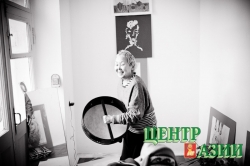 - How would you characterize yourself in one word: who are you - singer, composer, poet, painter? - How would you characterize yourself in one word: who are you - singer, composer, poet, painter?
- I am, most of all, probably a painter. That is how I am different form other performers. Philosopher and painter.
- You pick extremely non-ordinary paints for your work - food products. In 2010 in Moscow, at Elena Vrublevskaya's gallery, you demonstrated your paintings, made with coffee, tea, and kefir. Why did you pick those?
- It happened by itself. One morning during a tour I was sitting at breakfast in a café. There was a white paper napkin on the table. By chance I took a spoon with remains of coffee and drew a line. The paper absorbed it. I kept that napkin, and I got than idea: one can paint with coffee!
So I started experimenting. And it turned out that you can paint not just with coffee, but with tea, chocolate, kefir, cream, ketchup - leftover breakfast tat you did not want to throw out.
Children love to do this. When my daughter was little, she used to smear food all over the table with great enthusiasm. And painters are like children, they work with the feeling of the moment.
- What do you like to work with best? Tea, coffee, or milk products?
- Instant coffee and Chinese pu-errh tea: it is dark, brown, it is very convenient to work with it.
But it was very complicated with the tea, I had to learn a lot. I had to bring handmade paper especially from China. It is very important for the paper to be of high quality, so that it would absorb and keep the color well.
I showed 25 of my works in the spring of last year at Vrublevskaya's gallery in a personal exhibition "Sounds of the Upper World".
Now there are two paintings at the national Museum of Republic Tuva, that I gave to the museum. One of them, - "Portrait" - is made with chocolate.
The second - "Breakfast" - is a breakfast of two people together after a night of love. It is made with tea - green Japanese and black Chinese tea.
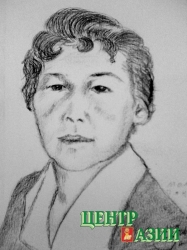 - Your exhibition openings are also performances; when Sainkho is there, there is movement and sound. - Your exhibition openings are also performances; when Sainkho is there, there is movement and sound.
- Yes, I may sing or paint at exhibitions of my own work. For example, I have this concept, it is called "History for one night in black and white": singing and painting at the same time.
I have done it in Moscow, at "Tipografiya" gallery - it is a former printers' building with a hall where they often exhibit experimental works. I showed works that were finished, plus I hung large white sheets of paper, on which I drew with coal while singing.
Being Angry is Senseless
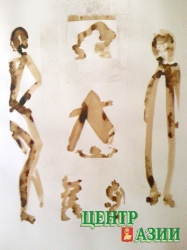 - Do you often have reasons to cry? - Do you often have reasons to cry?
- I am a very restrained person in that way. And also hard to some extent. Because I have gone though many difficulties. Very many. It would take many hours to recall and talk about all of it.
And apparently at some moment I have passed the point when it is so difficult, so complicated, that one does not have words for it and tears are not enough. And gradually one gets used to it and becomes not like unfeeling, but it simply goes away somewhere .
So I started crying less, even though sometimes it is good for you. But even though earlier I could get very upset and bitter, now I can cry without being angry with people, because I understand that is my fate. Karma.
Earlier, I could get very angry. But that, more than anything, was more similar to masochism. It does not help. Being angry is not a method.
One can't allow oneself to reach such a degree of anger, it never gives sober, useful results. It is senseless; you feel bad, and others feel bad too.
- Is there something painful that you can't forget to this day?
- It is difficult to remember. I do not remember bad things for long.
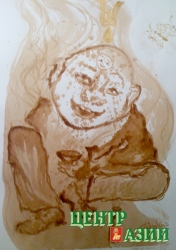 - What irritates you in people? - What irritates you in people?
- When they are lying to themselves. And it is even worse when everybody else can see it.
- What is the wisest advice that you ever received in your life?
- There were many advices. Probably it is one that I received during a seminar of Eastern philosophy: towards everything, keep an attitude of a light smile. To keep that all-forgiving, all-understanding smile inside.
- Does it work?
- Not always. Sometimes it is very, very hard. Bt it is possible.
To treasure your close ones also does not always work. You do what you can, and sometimes the results are different: you wanted the best, and look what happened…
- Are you a good mother and grandmother?
- I try to be good. But the matter is that because of my profession it is very complicated. But I try very hard.
- Has your grandson Timur ever been to his historical homeland?
- When he was four years old. My daughter went to Tuva with her friend and she took him along. She speaks Russian without an accent. But she does not speak Tuvan.
Heard Once, Remembered Forever
 - Which languages, beside Russian and Tuvan, do you speak fluently? - Which languages, beside Russian and Tuvan, do you speak fluently?
- A little bit of English and German. Vienna is a city where almost everybody speaks several languages. It is a normal phenomenon.
- Which language do you think in?
- In three languages at the same time. Most often I use Russian, sometimes German. I use Tuvan when I have to think about something very important so that nobody could somehow catch even the drift of the thought.
- Do you have your own apartment or a house in Vienna?
- Nothing at all. I rent a room in a three-room apartment. Young kids live in the other two rooms - university students. my daughter has a tiny two-room apartment.
- Are you a strong woman?
- In some things I am strong, in other things I am very weak. I still can't learn to balance things: material and spiritual.
- Where is the problem - with the spiritual or the material?
- The material part. It does not work out as well.
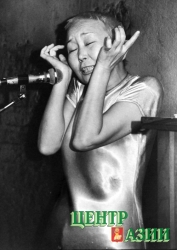 Living in Vienna is very expensive, the prices keep going up, it is a real nightmare. There are many problems. Many. Foundations for support of arts, including music, are closing one after another, and their budgets are decreasing. So one has to go to the commercial level, or simply to tighten one's belt and work on suitable projects. Living in Vienna is very expensive, the prices keep going up, it is a real nightmare. There are many problems. Many. Foundations for support of arts, including music, are closing one after another, and their budgets are decreasing. So one has to go to the commercial level, or simply to tighten one's belt and work on suitable projects.
But I believe that the main riches is what I leave to people. To date I have recorder forty-four excellent albums. Two albums every year. Plus the paintings, plus books.
The book "Zemlya karmy" (Land of karma) was published in 2005 in Italy: in English with Italian translation. It contains texts of my own songs, written in English.
In that same year 2005, there was also a second book "Chelo-vek" - published in Russia, in Sankt-Peterburg: diary texts in Russian, some texts in Tuvan and English.
Then a new double album "Cyberia" was released in 2011 in Italy, I thank the Italians for their support.
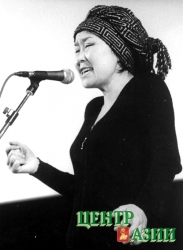 One disc consists completely of songs; four traditional - a potpourri of Tuvan folk songs, the rest are my own. The other disc is completely improvisation, but associated with tradition. Whatever I could get from listening to recordings of shamanic séances, chanting of monks. Just voice. No work-up. One disc consists completely of songs; four traditional - a potpourri of Tuvan folk songs, the rest are my own. The other disc is completely improvisation, but associated with tradition. Whatever I could get from listening to recordings of shamanic séances, chanting of monks. Just voice. No work-up.
Few will be able to get the album. It is very expensive, recorded in analog studio in analog vinyl format. Chiefly, it will be distributed throughout archives and DJ's.
I am preparing another project in an English firm - duet project with Joelle Leandre) - jazz, very avant-garde, very laboratory.
- Is it music for the chosen ones?
- Yes, I do not have a large audience, but it is very intellectual. Every one of them is worth hundreds. Those are the people who create music which will be still relevant ten, maybe twenty years in the future.
Those who heard it once remember it forever.
Western people have seen everything, and it is very complicated to surprise them. It is even more difficult to play on the strings of their souls. And to get them to want it again and again is even more complicated. And to change their consciousness is an even more complicated task.
I am always trying to fulfill these tasks, but I do not always manage to fulfill all four.
Photos
- Shaved head befits me, it's laconic and ascetic. Milano, Italy, 2000
- Sainkho and Georg. Joint journey to Russia. May 1991.
- Chay-Suu and Timur - daughter and grandson. Vienna, April 2011.
- Poster of the international jazz and folk music festival, that took place in Abakan in 1989. Sainkho calls that festival historic.
- Sainkho in residence of painter Timofey Karaffa-Korbuta with her beloved drum and paintings. Moscow, 2009.
- Sainkho Namtchylak. "Mama". Pencil, paper. 2004.
- Sainkho Namtchylak. "Coffee - writings". "Nestle" coffee, paper. 60×110. 2008.
- Sainkho Namtchylak. "Tea lover". Tea. 60×105. 2009.
- Jazz Europe first saw her like this. On Sainkho's head it's vynil disk of cultic group "Dead can dance". 1991.
- Saint-Petersbourg, Russia. 1997.
- Another image. Wuppental, Germany. 1996
To be continued.
|
